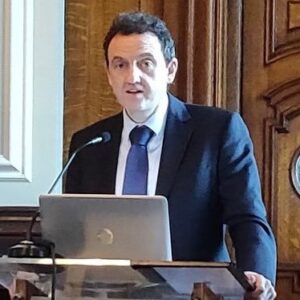The following is based on a communication sent by the UN Special Rapporteur on Human Rights Defenders and other UN experts to the Government of Eswatini on 24 January 2023, concerning the killing of the human rights defender and lawyer Thulani Maseko. The communication remained confidential for 60 days before being made public, giving the Government time to reply. A reply from the Government was received on 6 February 2023.
As of the making of this post, the authors of the killing of Thulani have yet to be identified.
This is a shorter version of the original communication.
BACKGROUND
Mr. Thulani Maseko was a prominent human rights defender and lawyer. He was a senior member of Lawyers for Human Rights Swaziland and Chairperson of the Multi-Stakeholder Forum (MSF), a coalition of civil society organisations, women’s groups, trade unions, businesses, faith groups and political parties calling for peaceful democratic reforms in Eswatini. He was also a founding member of the Southern Africa Defenders Human Rights Network. Mr. Maseko contributed to the promotion of justice and human rights in Eswatini and the Southern-African region.
Concerns as to alleged retaliation against Mr. Maseko for his legitimate exercise of freedoms protected under international human rights law, including through his alleged arbitrary detention and the initiation of abusive criminal proceedings against him, were previously raised with the Eswatini Government on several occasions. See here and here.
ALLEGATIONS
In the night of 21 January 2023, Mr. Maseko was assassinated at his home in the Manzini region of Eswatini by an unknown assailant. The human rights defender, lawyer and pro-democracy campaigner was shot dead in the presence of his wife and children, with the assailant reportedly firing through the window of their home. At the time of writing the communication, it was unclear whether the gunman acted alone, with the perpetrators yet to be identified.
The assassination of Mr. Maseko came hours after a public announcement by the King of Eswatini, Mswati III, in which he reportedly issued a warning to those spreading disharmony in the country, notably pro-democracy campaigners.
Authorities had stated they were investigating the killing.
CONCERNS
In the communication, I and my fellow UN experts expressed our grave distress over and condemnation of the assassination of Mr. Maseko, which we strongly fear to have been carried out in direct retaliation for his human rights work and leadership role in the pursuit of the full protection, realisation and fulfilment of human rights in Eswatini.
Considering Mr. Maseko’s work as a lawyer and in favour of strengthening the judiciary in Eswatini, we emphasised that international human rights standards provide that lawyers are entitled to perform their professional functions without any threat, intimidation, or harassment. We took the opportunity to recall that international human rights treaties binding on the Kingdom of Eswatini have been interpreted to recognize the crucial role of lawyers in ensuring fair trial guarantees, providing legal assistance in the context of economic, social, and cultural rights, and providing equal access to the justice system.
We urged the Government of Eswatini to ensure the thorough, prompt and impartial investigations of all suspected cases of unlawful killings, in line with the Principles on the Effective Prevention and Investigation of Extra-legal, Arbitrary and Summary Executions, adopted by Economic and Social Council resolution 1989/65, and the Revised United Nations Manual on the Effective Prevention and Investigation of Extra-Legal, Arbitrary and Summary Executions (the Minnesota Protocol on the Investigation of a Potentially Unlawful Death (2016)). We reminded the Government that a failure to conduct a proper investigation is regarded, in itself, as a violation of the right to life.
RESPONSE FROM THE GOVERNMENT
The Government, in its response, stated that it had initiated investigations “into all killings that have taken place recently”, and said that these investigations would be undertaken in an impartial and thorough manner “as befitting the circumstances”. The State expressed its concern at the killing of Mr. Maseko and stated that his life was never in any way threatened by the State. The Government did not substantially address the questions addressed to it in our communication.



